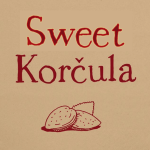May 28, 2018 – Continuing our look at the grapes of Croatia – a white wine synonymous with Korčula – Pošip.
Korčula island has several well known and respected indigenous varieties of white wine, and Pošip is among them. It is mostly grown in the sheltered fields in the central part of the island, Čara and Smokvica fields and around them, where most of the work in the vineyard is still done by hand, because of difficult approach. This is probably the variety of wine with best researched history, that goes back to the exact year (1864) and location when the first vine was discovered and started spreading in the fields of Čara and Smokvica.
The genetic analysis performed on the variety has shown that it comes from two less known varieties, Bratkovina Bijela and Zlatarska Bistrica, both varieties present exclusively on Korčula, so it is certain that Pošip was not brought to Korčula by sea (supposedly, by the Greeks who started growing vines on the island). In the last 30 or 40 years (in the sixties Pošip wine was the first white quality wine officially given that title) it has been cultivated elsewhere on the Croatian coast, on Pelješac, islands of Brač and Hvar and as north as Ravni kotari close to Zadar. The name of the variety has interesting story behind it – actually, it has two. “Pošip” either comes from a local word that describes the specific shape of the berry, or because the original vines were grown next to and around the pomegranate tree (šipak), which grows abundantly in the area.
The grapes are picked relatively early, and are unusually sweet for such an early variety, with adequate acids. One of the things wine-lovers almost never do is eat the grapes fresh, off the vine, but with Pošip – if you ever get the chance, go for it, it’s delicious to eat! Once the leftover grapes that haven’t been eaten are turned into wine, it is golden yellow in colour, very viscous in the glass, dry, it has relatively high alcohol content (sometimes over 14 percent) and the aroma is very fruity, reminiscent of apricots, citrus fruits, almonds and figs. Aged Pošip wine is best served at 12 – 14 °C, and should be had with grilled white fish or any type of seafood, white meats and stronger cheeses. Younger, fresher wine goes excellent with shellfish and as an aperitif. Some of the producers age the wine in oak barrels and then in the bottles, and Pošip from an oak barrel will be best friends with the octopus.
Traditionally, dessert wine was also made with Pošip grapes, but these days not a lot of desert Pošip wine can be found. Many local producers create excellent Pošip, and probably most famous is PZ Pošip Čara. One very famous wine-making name is also making some wonderful Pošip wine: Mike Grgich in his Pelješac winery, and so is the Korta Katarina winery from Orebić. On Korčula side of the channel there are other excellent producers of Pošip, Intrada Krajančić winery, Šain-Marelić winery and Kunjas winery headed by a very young chief oenologist, making some breakthroughs. Outside of the Korčula area Bibich is producing Pošip in his vineyards around Skradin, Plenković has vineyards near Makarska and his Pošip won Decanter awards, showing that there is great potential for Pošip beyond Korčula. Additionally, if you ever see a Pošip made on Brač, called Pošip Stina, you will recognize it as it has one of the most notable wine labels in Croatia.
Korčula island has several well known and respected indigenous varieties of white wine, and Pošip is among them. It is mostly grown in the sheltered fields in the central part of the island, Čara and Smokvica fields and around them, where most of the work in the vineyard is still done by hand, because of difficult approach. This is probably the variety of wine with best researched history, that goes back to the exact year (1864) and location when the first vine was discovered and started spreading in the fields of Čara and Smokvica.
The genetic analysis performed on the variety has shown that it comes from two less known varieties, Bratkovina Bijela and Zlatarska Bistrica, both varieties present exclusively on Korčula, so it is certain that Pošip was not brought to Korčula by sea (supposedly, by the Greeks who started growing vines on the island). In the last 30 or 40 years (in the sixties Pošip wine was the first white quality wine officially given that title) it has been cultivated elsewhere on the Croatian coast, on Pelješac, islands of Brač and Hvar and as north as Ravni kotari close to Zadar. The name of the variety has interesting story behind it – actually, it has two. “Pošip” either comes from a local word that describes the specific shape of the berry, or because the original vines were grown next to and around the pomegranate tree (šipak), which grows abundantly in the area.
The grapes are picked relatively early, and are unusually sweet for such an early variety, with adequate acids. One of the things wine-lovers almost never do is eat the grapes fresh, off the vine, but with Pošip – if you ever get the chance, go for it, it’s delicious to eat! Once the leftover grapes that haven’t been eaten are turned into wine, it is golden yellow in colour, very viscous in the glass, dry, it has relatively high alcohol content (sometimes over 14 percent) and the aroma is very fruity, reminiscent of apricots, citrus fruits, almonds and figs. Aged Pošip wine is best served at 12 – 14 °C, and should be had with grilled white fish or any type of seafood, white meats and stronger cheeses. Younger, fresher wine goes excellent with shellfish and as an aperitif. Some of the producers age the wine in oak barrels and then in the bottles, and Pošip from an oak barrel will be best friends with the octopus.
Traditionally, dessert wine was also made with Pošip grapes, but these days not a lot of desert Pošip wine can be found. Many local producers create excellent Pošip, and probably most famous is PZ Pošip Čara. One very famous wine-making name is also making some wonderful Pošip wine: Mike Grgich in his Pelješac winery, and so is the Korta Katarina winery from Orebić. On Korčula side of the channel there are other excellent producers of Pošip, Intrada Krajančić winery, Šain-Marelić winery and Kunjas winery headed by a very young chief oenologist, making some breakthroughs. Outside of the Korčula area Bibich is producing Pošip in his vineyards around Skradin, Plenković has vineyards near Makarska and his Pošip won Decanter awards, showing that there is great potential for Pošip beyond Korčula. Additionally, if you ever see a Pošip made on Brač, called Pošip Stina, you will recognize it as it has one of the most notable wine labels in Croatia.










